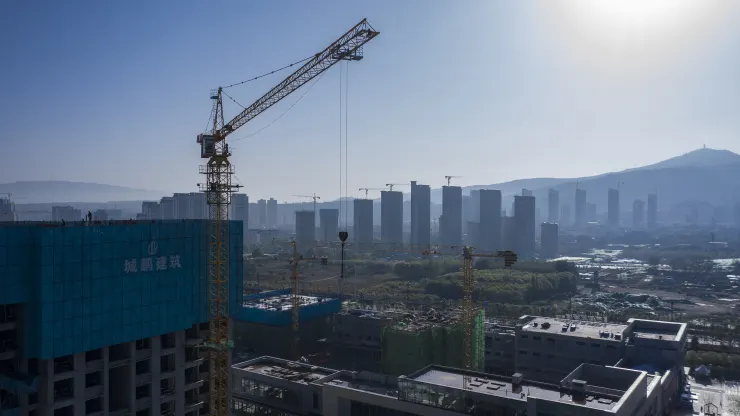News Highlights:
- Analysts suggest that China’s sizable real estate market, a significant component of the country’s economy, requires increased governmental support to avert further decline.
- In a note, Larry Hu, the chief economist at Macquarie, highlighted that existing home prices experienced their most substantial drop since 2014 in October. Additionally, he noted that outstanding property loans witnessed their inaugural decline in history during the same period.
- On Friday, the People’s Bank of China disclosed a meeting with other financial regulators, signaling their decision to permit lending to real estate developers functioning normally. This action was part of various supportive measures for the sector.
Analysts underscored the need for more government backing in China’s property market, a significant contributor to the nation’s economy, to prevent further decline. October witnessed the steepest drop in existing home prices since 2014, alongside a historic decrease in outstanding property loans, as highlighted by Larry Hu, chief economist at Macquarie, in a Friday note.
These trends point to mounting pressures on both the demand and supply sides of the market. While current policies have concentrated on stimulating demand, Macquarie’s report suggests that the pivotal issue of credit risk linked to developers remains unaddressed.
The report highlighted the absence of a lender of last resort, raising concerns about a potential self-fulfilling confidence crisis. This scenario could unfold as decreasing sales and escalating default risks exacerbate one another. The report further noted the rapid increase in credit risks for some prominent developers in recent times.
Beijing has aimed to diminish real estate developers’ heavy dependence on debt to propel growth, simultaneously curbing a steep rise in home prices that has rendered purchasing an apartment unaffordable for numerous young Chinese households in major cities.
According to UBS analysts, real estate and associated sectors currently contribute to roughly 22% of China’s gross domestic product (GDP), a decline from the approximately 25% levels observed in preceding years.
Starting from November 2022, Chinese authorities have implemented a series of measures. These initiatives target enhancing developers’ access to funding and lowering mortgage rates with the intention of improving the overall landscape of the real estate market.
Nevertheless, the real estate giant Country Garden reportedly defaulted on a U.S. dollar bond last month, as per Bloomberg News.
On the buyers’ side, Nomura analysts estimated approximately 20 million units across China have been sold but remain unfinished.
In China, it’s common for apartments to be sold before their completion. However, developers’ incapacity to finalize construction on these pre-sold properties led numerous homebuyers last year to halt mortgage payments for homes they had already purchased but were yet to receive.
Are the Markets Excessively Optimistic?
Recent data indicates a further deterioration in the property sector.
According to a report by Nomura analysts citing official data, the average price of existing homes in 70 major cities declined by 0.6% in October, compared to a 0.5% drop in September. Notably, China’s biggest cities led the downturn.
This trend is worrisome as larger cities typically sustain a consistent demand for homes due to employment opportunities.
The report cautioned that the property sector in China has not yet reached its lowest point. It highlighted that markets might have been excessively optimistic regarding the effectiveness of property stimulus policies in the past couple of months.
Additional Advanced Indicators or Superior-Level Cues.
In recent days, policymakers have actively tried to communicate increased assistance.
The People’s Bank of China disclosed a meeting held late Friday with other financial regulators aiming to permit lending to real estate developers categorized as “operating normally.” This move, among other supportive signals, includes a directive to encourage the development of affordable housing, as per the released information.
According to a report by Citi analysts on Monday, the meeting’s objective is to prevent a potentially unfavorable reduction in credit extension during the final months of the year. Financial institutions typically time new loan agreements for the new year to initiate a robust start, and this meeting is expected to aid in avoiding such a credit contraction.
The report also highlighted that the persistent focus on supporting real estate financing and resolving LGFV (Local Government Financing Vehicle) debt will help in curbing the escalation of risks. With the economy’s fragility demanding a supportive monetary environment, this meeting signifies a step in the necessary direction. However, further support is still required to bolster private sector confidence.
On Monday, the stock prices of various significant property companies saw an uptick, exemplified by a 5.9% increase in the Hong Kong trading of developer Sunac.











